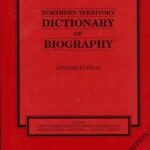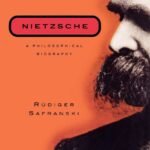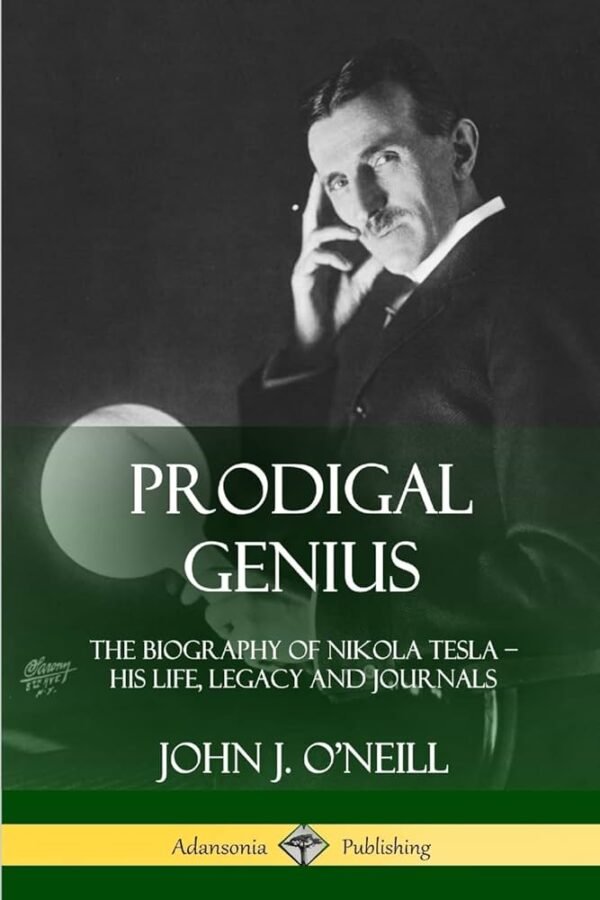Description
Nikola Tesla Biography: A Glimpse into the Life of a Genius
Nikola Tesla’s life has been the subject of numerous biographies, each seeking to unravel the complexities of this brilliant, yet often misunderstood, inventor. These books provide readers with an in-depth look at Tesla’s groundbreaking inventions, his personal struggles, and his eccentric lifestyle. One of the most popular and insightful works on Tesla is “Prodigal Genius: The Life of Nikola Tesla” by John J. O’Neill.
This biography paints a vivid picture of Tesla’s rise to fame, his involvement in the “War of Currents” against Thomas Edison, and his revolutionary contributions to electricity and magnetism. It also explores his visionary, yet unfulfilled dream of providing free wireless energy to the world.
O’Neill’s book delves into Tesla’s unique personality, shedding light on his quirks, obsessions, and reclusive lifestyle. Through his biography, readers are introduced to Tesla’s incredible genius and the sacrifices he made in pursuit of knowledge and discovery. It’s a captivating tale of brilliance and determination, revealing how Tesla’s work paved the way for modern technologies that we take for granted today.
“Prodigal Genius” and other biographical works offer an intimate look at Tesla’s triumphs and failures, showing both the brilliance and the human side of a man whose ideas were often far ahead of his time. These biographies not only chronicle Tesla’s contributions to science but also highlight the man behind the inventions, allowing readers to appreciate the depth of his intellect and the scale of his ambition.
Nikola Tesla: The Prodigal Genius
Few figures in the history of science have captured the public’s imagination as much as Nikola Tesla, the brilliant inventor and visionary who forever changed the world with his groundbreaking work on electricity, magnetism, and wireless technology. Often described as a “prodigal genius,” Tesla’s life is a tale of extraordinary intellect, eccentricity, and passion for discovery. His contributions to the modern world remain indispensable, and though he faced challenges and financial difficulties throughout his life, Tesla’s legacy endures.
Early Life and Education
Born on July 10, 1856, in the village of Smiljan, in what is now Croatia, Nikola Tesla was the son of a Serbian Orthodox priest and an inventive mother. From a young age, Tesla showed an intense curiosity about the world around him. He was particularly fascinated by electricity, and as a child, he would experiment with electrical devices, driven by an innate curiosity and a desire to understand how things worked.
Tesla attended the Austrian Polytechnic in Graz and later studied at the Charles University in Prague, excelling in mathematics and physics. It was during his academic years that he became captivated by the concept of alternating current (AC), which would later become the cornerstone of his scientific legacy.
Tesla’s Move to the United States
In 1884, Tesla moved to the United States, a country that would become his home and the place where he would make some of his greatest contributions to science. Initially, Tesla worked for Thomas Edison, helping him improve his direct current (DC) electrical systems. However, their relationship quickly soured due to a clash of ideas and personalities. While Edison was a staunch supporter of DC, Tesla believed in the superiority of alternating current (AC), which would allow for more efficient and widespread distribution of electricity over long distances.
Tesla left Edison’s employment after a disagreement over compensation and set out on his own to pursue his vision of AC power.
The War of Currents
One of the most famous episodes in Tesla’s life was the War of Currents, a fierce rivalry between Tesla’s alternating current (AC) and Edison’s direct current (DC). Tesla’s AC system proved to be far more efficient, and with the support of industrialist George Westinghouse, Tesla developed the AC system that would become the standard for electrical power generation and distribution around the world.
The rivalry between Tesla and Edison was intense, and both men sought to demonstrate the superiority of their systems. Edison launched a smear campaign against AC, even staging public electrocutions to showcase its dangers. Despite this, Tesla’s AC system ultimately won the battle, and it became the foundation for the modern electrical grid.
Tesla’s Key Inventions
While Tesla is best known for his work with AC power, his inventive genius extended far beyond this. Some of Tesla’s most significant inventions include:
- The Alternating Current (AC) System: Tesla’s greatest achievement, the AC system, allowed for the efficient transmission of electricity over long distances, revolutionizing the way power is generated and distributed.
- The Tesla Coil: A high-frequency transformer that produces high-voltage electricity, used in early radio transmission and various modern applications.
- Wireless Technology: Tesla was a pioneer in wireless communication, developing ideas that would later lead to the invention of the radio and modern wireless devices.
Tesla’s Vision of Wireless Energy
One of Tesla’s most ambitious projects was the Wardenclyffe Tower, a massive structure designed to transmit wireless energy across the globe. Tesla believed that it was possible to transmit power wirelessly and envisioned a world where people could access free energy, eliminating the need for cables and infrastructure.
Unfortunately, due to a lack of funding and support, the Wardenclyffe Tower project was never completed, and Tesla’s dream of free wireless energy remained unrealized.
Later Years and Decline
Despite his groundbreaking work, Tesla struggled with financial difficulties later in life. Many of his inventions were ahead of their time, and he found it hard to secure the necessary financial backing to bring them to fruition. By the 1920s, Tesla had become increasingly isolated and eccentric, living in a series of New York hotels and focusing on experiments that garnered little attention or success.
However, even during these difficult times, Tesla continued to work tirelessly on his ideas, convinced that his work would eventually be recognized for its importance.
Tesla’s Personality and Lifestyle
Nikola Tesla was known for his eccentric personality. He followed strict daily routines and had a particular obsession with cleanliness and numbers, especially the number three. Tesla was also famously averse to physical contact, avoiding handshakes and human interaction as much as possible. Despite his quirks, Tesla maintained friendships with some of the most prominent figures of his time, including author Mark Twain, who admired Tesla’s genius.
Tesla never married, choosing instead to dedicate his life entirely to science and discovery. His work consumed him, and he often worked for days on end without sleep, driven by an insatiable desire to solve the mysteries of the universe.
Legacy and Impact
Though Tesla faced many challenges during his lifetime, his impact on modern technology is immeasurable. His contributions laid the groundwork for much of the technology we rely on today, from electrical power systems to wireless communication. Tesla’s alternating current system is still the foundation of the electrical grid, and his ideas on wireless energy and communication have influenced everything from radio to the internet.
Tesla’s visionary ideas inspired future generations of scientists, engineers, and inventors, many of whom regard him as a pioneer of modern technology. Today, Tesla is celebrated as a visionary whose ideas were ahead of his time, and his influence continues to be felt in many fields of science and technology.
Misunderstood Genius
Tesla’s life was one of paradox. While his inventions revolutionized the world, he struggled to achieve financial success and recognition during his lifetime. Many of his ideas were too advanced for the era in which he lived, leading to misunderstandings and missed opportunities. Tesla was also a victim of his own generosity, often foregoing patents and profits in favor of freely sharing his ideas.
Famous Quotes by Nikola Tesla
- “The present is theirs; the future, for which I really worked, is mine.”
- “If you want to find the secrets of the universe, think in terms of energy, frequency, and vibration.”
- “Let the future tell the truth, and evaluate each one according to their work and accomplishments. The present is theirs; the future, for which I have really worked, is mine.”
Tesla in Popular Culture
In recent years, Nikola Tesla has experienced a resurgence in popular culture, with his life and work being portrayed in movies, books, and TV shows. Films like The Prestige and documentaries about his life have helped to rekindle public interest in his genius. Tesla’s status as an enigmatic figure of science has made him a favorite subject of fictional stories and conspiracy theories alike.
The Reemergence of Tesla’s Popularity
Tesla’s name has also become synonymous with innovation, particularly in the field of electric vehicles. The Tesla Motors company, founded by Elon Musk, honors Tesla’s legacy by advancing the development of electric cars and renewable energy technologies. This resurgence of interest in Tesla’s work has helped cement his status as one of the greatest inventors of all time.
Honors and Awards
Although Tesla received limited recognition during his lifetime, his contributions to science have been celebrated posthumously. Today, he is regarded as one of the most important inventors in history. Various scientific institutions, awards, and even units of measurement (such as the Tesla unit of magnetic flux density) are named in his honor.
Conclusion
Nikola Tesla was a visionary and a prodigal genius whose inventions and ideas transformed the world. Though his life was marked by financial struggles and eccentricity, his work laid the foundation for much of modern technology. Tesla’s legacy is one of innovation, perseverance, and an unwavering belief in the power of science to improve the world. His ideas continue to inspire and shape the future, reminding us that true genius often goes unrecognized in its time but never forgotten.
FAQs About Nikola Tesla
- What was Nikola Tesla’s most significant invention?
Tesla’s most significant invention was the alternating current (AC) system, which revolutionized the way electricity is generated and distributed. His AC system allowed electricity to be transmitted efficiently over long distances, powering homes and industries worldwide. - Why did Nikola Tesla and Thomas Edison have a rivalry?
Tesla and Edison’s rivalry, known as the War of Currents, centered around their conflicting ideas on electricity. While Edison promoted direct current (DC), Tesla advocated for alternating current (AC), which he believed was more efficient. This led to a public battle over which system would become the standard for electrical power distribution. - Did Nikola Tesla invent the radio?
While Guglielmo Marconi is often credited with inventing the radio, Tesla made significant contributions to the development of wireless communication technology. In fact, Tesla’s patents related to radio were recognized by the U.S. Supreme Court in 1943, solidifying his role in its creation. - What was the Wardenclyffe Tower?
The Wardenclyffe Tower was an ambitious project by Tesla to transmit wireless energy across the globe. He envisioned a world where electricity could be accessed wirelessly, without the need for cables or infrastructure. Unfortunately, the project was never completed due to financial difficulties. - Why is Nikola Tesla considered a misunderstood genius?
Despite his groundbreaking inventions, Tesla struggled to gain financial success and recognition during his lifetime. His visionary ideas were often ahead of their time, leading to misunderstandings and missed opportunities. Tesla’s selfless nature, where he often prioritized science over profit, further contributed to his financial difficulties.




Reviews
There are no reviews yet.